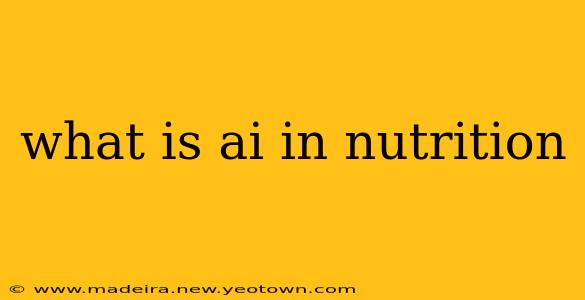What is AI in Nutrition? A Deliciously Intelligent Revolution
Imagine a world where personalized nutrition plans are as easy to access as your favorite streaming service. Where dietary recommendations are tailored not just to your age and activity level, but to your unique genetic makeup, microbiome, and even your emotional state. That's the promise of AI in nutrition – a rapidly evolving field poised to revolutionize how we approach food and health.
It's not about replacing registered dietitians; it's about empowering them and us, the consumers, with powerful tools to make healthier choices. This isn't some futuristic fantasy, either; AI is already subtly changing the landscape of nutrition, and the changes are only going to accelerate.
Let's dive into the fascinating world of AI and its impact on the way we eat:
How is AI Used in Nutrition?
AI is being used in many different and exciting ways within the nutrition space. From analyzing vast datasets to providing personalized advice, its applications are constantly expanding. Here are some key examples:
-
Personalized Diet Recommendations: This is perhaps the most exciting application of AI. By analyzing your dietary habits, health data, genetic predispositions, and even your lifestyle choices, AI algorithms can generate personalized meal plans and dietary recommendations tailored specifically to your needs. Forget generic advice – AI offers hyper-personalization.
-
Nutritional Assessment and Monitoring: AI can automate the analysis of dietary intake data, tracking progress toward goals, and identifying potential deficiencies or excesses. This takes a lot of the manual work out of nutritional assessment, freeing up dietitians to focus on the more nuanced aspects of patient care.
-
Food Recognition and Tracking: Apps are already using AI-powered image recognition to identify foods, automatically logging their nutritional content. This eliminates manual input, making it easier to accurately track what you're eating.
-
Ingredient Analysis and Recipe Generation: Imagine an AI that not only analyzes the nutritional content of a recipe but also suggests healthier substitutions to improve its overall nutritional profile. This can help both individuals and food manufacturers create healthier and more appealing products.
-
Predictive Modeling for Health Outcomes: AI can be used to predict the likelihood of developing certain health conditions based on dietary habits. This predictive power allows for early interventions and proactive strategies to prevent disease.
What are the Benefits of AI in Nutrition?
The benefits are numerous and far-reaching:
-
Improved Accuracy and Efficiency: AI can analyze large datasets far faster than any human, leading to more accurate and efficient nutritional assessments and recommendations.
-
Enhanced Personalization: AI enables personalized nutrition plans, making healthy eating achievable and sustainable for everyone.
-
Increased Accessibility: AI-powered tools can make nutrition expertise more accessible to underserved populations, reducing health disparities.
-
Early Disease Prevention: By predicting health outcomes based on dietary patterns, AI can support early interventions and prevent chronic diseases.
-
Empowering Consumers and Professionals: AI supplements the expertise of registered dietitians, allowing them to focus on complex cases while providing more efficient and accessible care to a larger patient base.
What are the Challenges of AI in Nutrition?
Despite the incredible potential, challenges remain:
-
Data Privacy and Security: Handling sensitive health data requires robust security measures to prevent breaches and protect patient privacy.
-
Algorithmic Bias: AI algorithms can perpetuate existing biases if the data used to train them is not diverse and representative.
-
Lack of Regulation and Standardization: A clear regulatory framework is needed to ensure the safety and efficacy of AI-powered nutrition tools.
-
Ethical Considerations: Questions surrounding data ownership, transparency, and accountability need to be addressed carefully.
Will AI Replace Nutritionists and Dietitians?
Absolutely not. AI is a powerful tool, but it is not a replacement for the human expertise of registered dietitians. Dietitians provide a holistic approach, considering individual circumstances, psychological factors, and lifestyle preferences, which AI currently cannot fully replicate. AI will augment and support their work, making them even more effective in providing personalized and comprehensive nutritional care.
This exciting field is constantly evolving, but one thing is certain: AI is poised to transform the way we think about and interact with nutrition, ushering in a new era of personalized and preventative healthcare. The future of nutrition is intelligent, and it's delicious.

